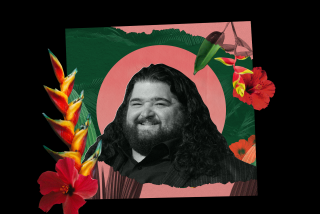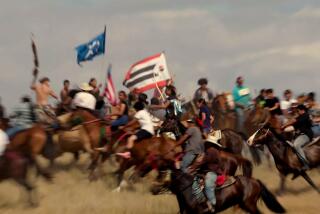‘Paradise Lost’ Holds a Mirror to America
Three 8-year-old boys are found slaughtered in an Arkansas woods. Three unsavory-looking suspects are brought in as allegations of satanic worship saturate the airwaves. Parents are grieving, the public is seething, the case seems open-and-shut. And the movie audience has become a lynch mob.
Yes, we viewers are righteously sandbagged at the outset of “Paradise Lost: The Child Murders at Robin Hood Hills,” but that’s OK. In chronicling the 1993 slayings and trial, Joe Berlinger and Bruce Sinofsky, directors of the highly acclaimed “Brother’s Keeper,” have made a movie less about simple guilt or innocence than about presumptuousness, stupidity and prejudice.
Making their audience part of it, even for a few moments, isn’t a bad technique.
“Paradise Lost” is far more ambiguous and certainly less uplifting than “Brother’s Keeper,” but what Berlinger and Sinofsky prove again is their unmatched talent for gaining access to people caught up in tragedy. The parents of the victims expose themselves alarmingly, raging for vengeance; the families of the suspects plead for reason, a quality entirely absent from the proceedings.
West Memphis police broke open the case by wresting a confession out of Jessie Misskelly Jr.--a tiny 17-year-old with an IQ of 72. He implicated Jason Baldwin, 16, and his best friend, Damien Echols--a highly intelligent 18-year-old who wore black, listened to heavy metal and dabbled in earth-worshiping white magic (Damien’s most grievous offense is being smarter than everyone else in tacky West Memphis).
Produced originally for HBO (where it had a monthlong run this summer), “Paradise Lost” is as important a film as will be seen this year. It has its faults: Some of the principals undergo physical changes that make them hard to identify as the case progresses. There are questions raised about trial procedure: Given that there was no physical evidence linking the three to the crime, did the defense ever make a motion to dismiss?
The most frightening thing about “Paradise Lost” isn’t the violence that’s been committed (the film presents its own alternate suspect) but rather that people’s lives are in the hands of such raging incompetents. The look on one prosecutor’s face when he hears in court that his “expert” on the occult has a mail-order doctoral degree is priceless.
There are no heroes in “Paradise Lost” but plenty of villains. Some of the critics who came down on the film at the Sundance Festival this year thought the filmmakers were ridiculing Arkansas “trailer trash.” But there’s no regionalism here. What Berlinger and Sinofsky do is hold up a mirror to America as a whole. And it’s not their fault if the picture isn’t pretty.
* Unrated. Times guidelines: contains graphic murder scene photos, adult situations and language.
‘Paradise Lost: The Child Murders at Robin Hood Hills’
A Hand-to-Mouth production, released by Creative Thinking International Ltd./Gotham Entertainment Group. Directors-producers-editors Joe Berlinger and Bruce Sinofsky. Cinematographer Robert Richman. Music Metallica. Running time: 2 hours, 30 minutes.
* Exclusively at the Nuart, 11272 Santa Monica Blvd., (310) 478-6379.
More to Read
Only good movies
Get the Indie Focus newsletter, Mark Olsen's weekly guide to the world of cinema.
You may occasionally receive promotional content from the Los Angeles Times.










